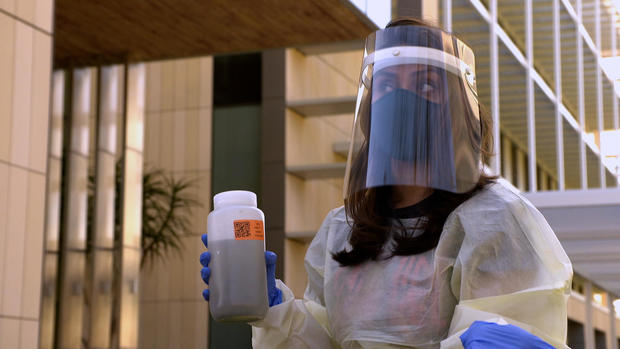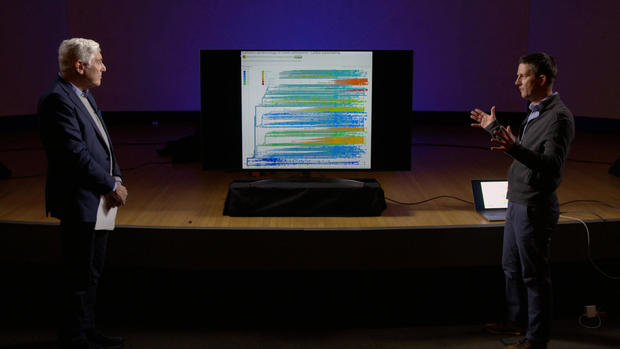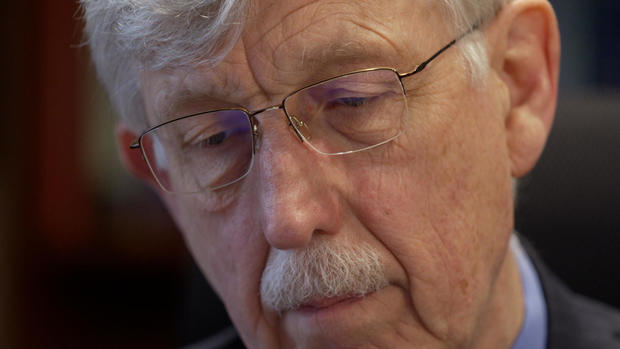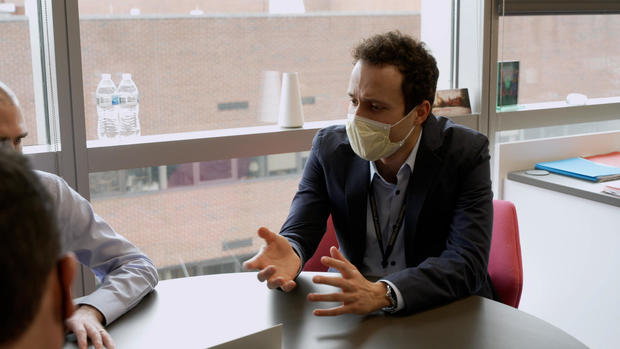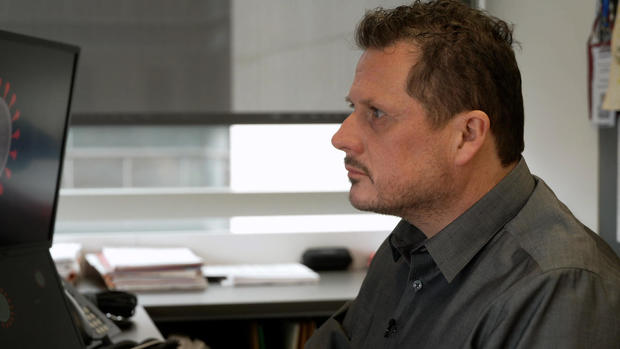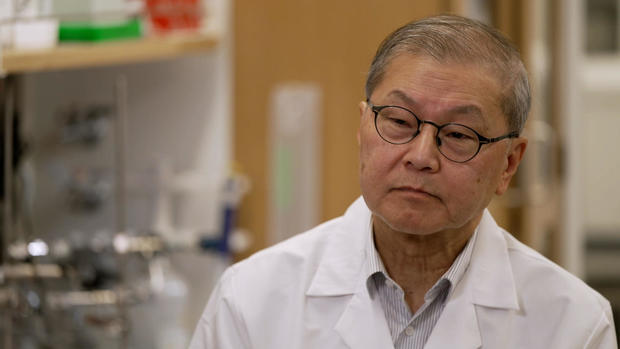Over 2 million Americans are receiving vaccinations every day, fueling hope the end of the pandemic is near. But since the SARS-CoV-2 virus emerged in Wuhan, China 14 months ago, over 100 million people worldwide have been infected. And with each infection, the virus has had the chance to mutate into genetic offspring called variants. One of those variants, first identified in the U.K., has spread across the U.S. and is estimated to be 50% more transmissible than the original virus, and likely more deadly.
Nationwide, COVID-19 cases have fallen, but public health officials are warning if these variants continue to spread, they could trigger a new surge of infections.
News the U.K. variant had reached American shores came last December at the University of California San Diego. The variant was found as part of an extensive coronavirus surveillance and testing system that has kept nearly 25,000 people living and working on campus.
Vending machines designed to dispense candy bars, now offer nasal swabs for COVID testing. And golf carts go on daily runs, collecting samples taken from wastewater.
Dr. Jon LaPook: Oh, there’s the fluid.
Smruthi Karthikeyan: There you go. Do you see it?
Dr. Jon LaPook: Yeah. Sure.
Smruthi Karthikeyan: So now, if we pick this up…
Environmental engineer Smruthi Karthikeyan showed us how robots, placed near over 300 student dorms and research buildings, suck up sewer samples, looking for early evidence someone might be infected with the virus.
Dr. Jon LaPook: And if there’s a positive, what happens?
Smruthi Karthikeyan: If there’s a positive they will send targeted notices saying, “your building, the wastewater has been positive. And please go get tested.”
Many positive samples from wastewater and nasal swabs are sent here, to nearby Scripps Research, where infectious disease researcher Kristian Andersen’s lab performs genetic sequencing to identify any variations.
Kristian Andersen: It’s really important that we keep an eye on the virus. How is it evolving? How is it transmitting? How is it changing?
Genetic sequences from around the world are constantly being analyzed in a database called Nextstrain that Andersen and other scientists use to visualize how variants are spreading.
Dr. Jon LaPook: These are beautiful colors but what am I looking at?
Kristian Andersen: you can think of this as a family tree. And what we have is down here… this is the first one in Wuhan. Viruses mutate over time. You see mutations coming up. And that’s when you start getting these branching patterns. Then you have sisters and brothers here and then you have aunts and uncles.
Dr. Jon LaPook: And what’s the practical use of having a tree like this?
Kristian Andersen: The practical use is that somebody like me can go in and let’s look at, like, how is this all related.
Since the original virus was first identified in December 2019, thousands of variants have been documented. Andersen says scientists are keeping a close eye on three of them they call “variants of concern.”
Kristian Andersen: That’s the U.K. variant which was, you can see here, was identified– dates back to about September of last year. And then all of a sudden, you get a lot of these? And that’s because it’s more transmissible.
So transmissible the Centers for Disease Control has projected the U.K. variant will be the dominant strain in the U.S. in the next month. The variants from Brazil and South Africa have already spread to dozens of countries, including the U.S.
Variants arise because the SARS-CoV-2 virus is constantly making copies of itself. As it replicates, tiny mistakes, or mutations, can occur in its genetic code. They’re rare and usually insignificant, but once in a while one or more mutations team up to create a more dangerous variant of the virus.
Dr. Francis Collins: We are reading evolution’s lab notebook. Every time one of these pops up, it’s telling us exactly how evolution benefits at the expense of the fitness of humankind.
Dr. Francis Collins, director of the National Institutes of Health, is a geneticist who 20 years ago oversaw the decoding of the human genome. He says he’s surprised by how much this virus is evolving.
Dr. Jon LaPook: Why are the variants of concern that we’re seeing in places like the United Kingdom, South Africa and Brazil of such concern?
Dr. Francis Collins: It turns out that some of these mutations actually change the behavior of this virus in a way that makes it more infectious or more serious. And the evidence is that, for both the B117, which is primarily seen in the U.K. but increasingly in the U.S. and the South African, B1351, that they are more transmissible. They’re just really successful.
Dr. Jon LaPook: We’re seeing evolution in motion?
Dr. Francis Collins: I think it’s been rarely seen as clearly as right now how evolution works. In that way, it was pretty predictable. What wasn’t predictable for me anyway was that there would be so many copies of this virus that even a slow evolutionary process could in just a matter of a few months produce some viruses that we’re worried about.
Dr. Jon LaPook: And there are so many copies because?
Dr. Francis Collins: It’s a pandemic. And it’s been very successful in infecting millions and millions of people.
An early clue about how the virus was mutating came last summer at the University of Pittsburgh Medical Center. Infectious disease specialist Dr. Ghady Haidar says a cancer patient with a compromised immune system came in with a COVID-19 infection that persisted for over 70 days — far beyond the typical few weeks.
Dr. Ghady Haidar: We had no idea at the time that people could still be actively infectious for that long. And it really wasn’t until after he passed away that we started running some additional testing on samples that he had allowed us to collect from him no when he was alive. And that’s when we found that the virus really quickly began to develop all these deletions and mutations throughout the patient’s life.
This electron microscope image shows a sample taken from the patient’s wind-pipe. Tiny spheres looked like the original virus from Wuhan, China.
But genetic sequencing revealed a different story, there were small gaps where information should be. Irish born University of Pittsburgh virologist Paul Duprex says the U.K. variant has some of these same deletions, leading some scientists to believe it may have started in an immunocompromised patient.
Dr. Jon LaPook: When you have a patient who is sick for so long, there’s the opportunity for the virus to replicate and replicate and replicate. And every time a virus has that opportunity to replicate, there’s also an opportunity for it to make a mistake, right?
Paul Duprex: And that’s how viruses change. Those mistakes give the virus just a little bit of a competitive edge. For example, can it get into a cell better?
Duprex says yes. He used this animation to show us how. It starts with the spike protein, seen in red, which the virus uses to latch onto and enter a human cell.
Paul Duprex: So if you’ve been infected, you’ll make antibodies, these blue molecules that bind to the outside of the virus spike. And what they do is they block the virus getting into the cell. They can’t bind to the receptor. Now, here’s a variant. The yellow illustrating the variant. The antibodies can no longer bind. The virus is able to attach to that receptor, latch on and bingo, that person gets infected.
Dr. Jon LaPook: Is there anything we can do to stop the virus from mutating so much?
Paul Duprex: Can certainly stop it making as many mutations by stopping it infecting as many people. If we block its transmission, if we wear a mask, if we get vaccinated, if we do social distancing. So there is a practical thing that we can do. But physically, biologically is there something that we can do? Is there a magic bullet that we can shoot at it that stops it making mutations? Nope.
To understand the threat posed by mutations, public health experts are studying the Brazilian city of Manaus. Last spring, COVID swept through the population, leaving about 70% infected. As a result, some researchers believed the city had reached herd immunity.
But then, starting this past December, epidemiologists suspect thousands were reinfected with the Brazilian variant. Hospitals there were overwhelmed. Health officials reported up to 150 deaths a day. And a recent study suggests the variant is more infectious than earlier strains and may be better at evading antibodies.
At Columbia University Irving Medical Center, Dr. David Ho, known for his groundbreaking HIV research, is now working to identify which variants are present in New York City. Since January, his team has analyzed over 2,000 nasal swabs taken from people who had tested positive for COVID-19.
Dr. David Ho: What was unexpected was there were only sporadic cases of the U.K., Brazilian and South African variants. But instead, we noticed that we had a homegrown variant.
Dr. Jon LaPook: Something new?
Dr. David Ho: Something new that was dominating and rising very rapidly.
Dr. Jon LaPook: How rapidly is it growing?
Dr. David Ho: It’s over 20%.
Dr. Jon LaPook: Over 20%? So that’s a rapid rise in the last couple of months.
Dr. David Ho: Right.
Dr. Ho says the New York City variant is doubling roughly every two weeks, and city health officials announced this past week they found the variant in 39% of the COVID-19 samples they recently sequenced. Dr. Ho is concerned because that variant shares a key mutation with one found in South Africa.
Several studies have looked at the effectiveness of the three vaccines authorized in the U.S. Against that South African variant. Both in laboratory tests and clinical trials, the vaccines appear to be somewhat less effective at eliciting an immune response or preventing infection — but the companies anticipate the vaccines will still provide protection from severe disease from that South African variant.
Dr. Jon LaPook: What people are worried about is, “I got a vaccine. I thought I was safe. And now you’re talking about all these variants. Where am I?”
Dr. David Ho: I’m in the same boat. I got vaccinated and I felt protected for a while, until we realized there was so much of the homegrown variant in New York.
Dr. Jon LaPook: How do you put this in perspective for people who are watching this right now?
Dr. David Ho: I think we have to be a bit concerned. But that doesn’t say the vaccines don’t work. Even in South Africa, the vaccines still work to some extent, it’s just not as highly protective as we had against the original strain. In addition, the vaccine may not protect against infection, but may protect against disease or death.
Dr. Collins says so far the Pfizer and Moderna vaccines appear effective against the U.K. variant. And this past week a small laboratory study found the Pfizer vaccine elicited the same strong immune response against the Brazilian variant as against the original virus. Drug companies say they are working to re-tool their vaccines and create booster shots, as needed, to keep up with the variants.
Dr. Jon LaPook: What keeps you up at night in terms of the variants down the line?
Dr. Francis Collins: If I have an anxiety it’s that something worse than the South African variant is out there that will get to the point where the vaccines no longer appear to be fully protective against a bad outcome. And that will certainly drive us then to do a redesign of the vaccines as quick as we can.
Dr. Jon LaPook: Recently, a variant has been found in New York City that has some of the characteristics of the variant of concern found in South Africa.
Dr. Francis Collins: I’m not on the surface of it overly alarmed about that. But it’s gonna deserve a real lab experiment to make sure that our vaccines would still provide immunity against that.
Dr. Jon LaPook: There’s a ton of political, economic and other pressure to have these vaccines be successful. Is the government committed to being totally transparent about these variants, about whether or not the vaccines are working? Or is there some kind of a filter?
Dr. Francis Collins: There cannot be a filter. I will not stand for that. Neither will Dr. Fauci. And absolutely, if we ever come across as having the truth of the matter distorted by what is politically or economically convenient, then we will have lost the public trust.
Dr. Collins says right now we have a window of opportunity, and that Americans need to get vaccinated, avoid large gatherings, and wear masks to prevent the virus from spreading and mutating even more.
Dr. Francis Collins: To continue to hear that this isn’t over yet has got to be a hard thing for all of us. I don’t want to sound so pessimistic though, we are making amazing progress. We just gotta hang on and don’t blow it at the end. If you’re the guy running for the finish line, don’t trip right there on the 10-yard line. Try to get all the way to the goal. We– we can see it. We’re gonna get there. But this is not the moment to relax or stop running hard.
Produced by Denise Schrier Cetta. Associate producers, Katie Brennan and Amy Birnbaum. Broadcast associates, Annabelle Hanflig, Sheena Samu and Deborah Rubin. Edited by Michael Mongulla.
